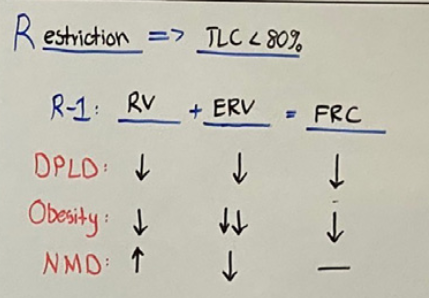simple vs complex restriction on PFT
- related: PFT and lung functions
- tags: #permanent #pulmonology
- simple restriction: FEV, FVC, TLC reduce all in the same proportion
- complex restriction: FVC reduction out of proportion to TLC reduction, RV is disproportionately high. There is problem with lung emptying1
DPLD
- in diffuse parenchymal lung disorder, the pattern of restriction is simple. Everything decreases at the same proportion, meaning the lung is diffusely affected.
NMD
- in early neuromuscular disorder, the inspiratory muscles are affected. Expiration is passive process and not as affected. In this case, the inspiratory effort or IRV and TLC are both affected (probably more simple restriction)
- in late neuromuscular disorder, the expiratory muscles are affected. In this case, RV is increased and TLC overall decreased, leading to complex restriction
Obesity
- In obesity, ERV is much lower because of increased abdominal content. However, RV could be same or increased, leading to either normal RV/TLC or increased RV/TLC.
COPD
- when there is gas trapping with restriction (mixed disorder), there can be complex restriction
Others
Conversely, when FEV1/FVC is low and FVC is normal, a superimposed restriction of lung volumes can almost always be ruled out.1
